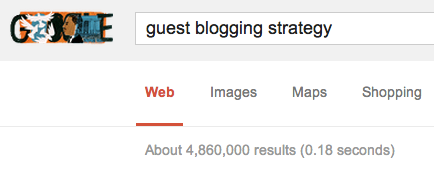If you haven’t heard yet, Matt Cutts just issued a decree that guest blogging is done, essentially killing another popular SEO tactic.
Consider this my official guest post on the demise of guest posting. Yes, this also makes me part of the reason why (as Matt says) we can’t have nice things in the SEO community.
Guest blogging is a tactic, not strategy

Let’s start off with the word “tactic.” I chose that word on purpose. We’ve all seen the plethora of “guest blogging strategy” posts and articles. I want to make one thing clear–guest posting is not a strategy. It’s a tactic. There’s a difference.
A strategy involves a long term plan and a goal. A tactic is merely one action that helps accomplish that strategy. I’ll get more into this in a minute.
It seems whenever an SEO tactic becomes popular, Google decides to take action on it. Why is that? Conspiracy theorists will be quick to update their usual argument about Google hating SEO and trying to sell more adwords and whatnot. Ignore them. Google doesn’t hate SEO. Google hates automated tactics that provide little value to actual website visitors such as creating links and content just to increase search rankings.
SEOs ruined guest blogging, not Matt Cutts
 The reason Google is taking action on guest posting is because we ruined it. We ruined it the same way we ruined meta keywords, and directories, and press releases, and blogrolls, and widgets, and infographics, and link exchanges, and article submissions, and forums, and comments, and wikipedia, and (on second thought I won’t mention this tactic, it still works,) and reviews, and ratings, and Pinterest, and, well you get the picture.
The reason Google is taking action on guest posting is because we ruined it. We ruined it the same way we ruined meta keywords, and directories, and press releases, and blogrolls, and widgets, and infographics, and link exchanges, and article submissions, and forums, and comments, and wikipedia, and (on second thought I won’t mention this tactic, it still works,) and reviews, and ratings, and Pinterest, and, well you get the picture.
We ruined guest posting just like we ruined everything that came before it and just like we’ll probably ruin whatever comes after it. It’s moments like this I’m glad Twitter isn’t a ranking factor, because I’m sure we’d ruin that too.
[Rhea note: actually, SEOs DID ruin Twitter when it and all other major social platforms were forced to implement nofollows!]
We went too “all-in” with guest blogging, and now we’re paying the price. For years it’s been the only link building tactic talked about at conferences and events. We even guest blogged about the best methods for finding blogs to guest blog on. Guest Blogging pretty much replaced the word link building in the same way that “[odd number] things [current trending topic] can teach us about [SEO|ORM|PPC|Mobile|Social]” replaced blog headlines.
Matt’s post shouldn’t come as a surprise. Anybody who’s been around SEO long enough knows that eventually all tactics are abused enough to find themselves in Google’s crosshairs.
SEOs need to fix our strategy, not the tactics
Guest blogging isn’t the problem though–we’re the problem. We can debate tactics all we want, but nothing is going to change. It’s the strategy that’s broken, and we need to address that.
It’s time our industry took a step back from the “what” and started taking a longer look at the “why” of SEO tactics. It’s time we put down our checklists and ranking factors and correlation studies and focused on our overall strategy and goals.
How SEOs brought the decay and fall of directories
How can we forget Danny Sullivan’s famous rant about directories and link building? If you missed it before, I’ll summarize:
A long time ago Google told us to go get directory links. At that time people actually used things like DMOZ or the Yahoo! directory to find sites, so it was good advice. The message was “go get your site linked where people will see it,” but all we heard was the word “directory.” Instead of trying to get our site mentioned in places where people actually went, SEOs started creating tons of directories nobody ever visited solely for the purpose of submitting our sites to them.
Directories weren’t the problem at all–SEOs just got the message wrong.
How SEOs brought the decay and fall of press releases
Sadly, we repeated the same process with press releases. The original message of “put out a press release, and if a journalist picks it up you’ll get lots of newspaper links” somehow got lost as we created programs to submit press releases to thousands of press release sites that have never been visited by an actual journalist.
(Tip: when the homepage of a site is geared toward getting you to submit and not toward actual site visitors, it’s not a good SEO strategy.)
Surely we learned after the PR backlash right? Nope.
How SEOs brought the decay and fall of forums and comments
We did the same with forum links and comment links. But we learned from that right? Of course not.
How SEOs brought the decay and fall of infographics
Like a moth to a flame we went full speed ahead into infographics. Sure, they started out useful. You’d see an infographic about population breakdowns that linked back to the census report or one about test scores that linked to some educational study. These were awesome and got tons of traffic. They were also relevant.
Somehow though, we forgot about the words “useful” and “relevant” and focused only on the word “infographic.” It’s almost as if we thought that somehow being attached to an infographic made spammy off topic links acceptable. Pretty soon we saw infographics about the best places to live in America that linked to play-poker-online-for-free-viagra.info
[Rhea note: actually, that domain is still available. Score!]
How SEOs brought the decay and fall of guest blogging
 Then came guest blogging. At first, many in the community were saying things like “this can’t be ruined, can it?” “Nobody would be stupid enough to mix in total spam on their own blog or put their name on it would they?”
Then came guest blogging. At first, many in the community were saying things like “this can’t be ruined, can it?” “Nobody would be stupid enough to mix in total spam on their own blog or put their name on it would they?”
No, they weren’t that dumb. They were dumber.
Not only did people start posting utter crap, but they even created blogs that nobody ever read for the sole purpose of posting utter crap. Then, they automated it.
I’m pretty sure “automatically generate articles and send them to scraped email addresses until somebody posts them” is NOT what Matt meant when he used words like “high quality,” “original,” relevant”, and “value” in his original condonement of guest blogging.) In his condemning post, Cutts used the word “decay” and given our history with SEO tactics, I can’t really think of a better way to describe it.
It’s not the tactic that matters, it’s the strategy.
If your strategy is to expose your site to a relevant audience by creating useful content and connections, you can’t go wrong. If your strategy is to simply change the method by which you automatically acquire low-quality, irrelvant, and high-risk links, you’ll end up right back here reading this same rant from me in a different medium.
Spammy guest blogging is dead, not guest posting
Guest blogging can still work. You wouldn’t turn down a column on CNN or an editorial in the Huffington Post if they said you couldn’t have a dofollow link would you? Of course not, because those places send traffic – and that’s the key. It’s about the audience, not the HTML.
- This is a guest post. You’re clearly reading it because I (hopefully) have something interesting to say. There’s probably a link to my personal website or twitter account (I’m not sure, I didn’t ask for anything) but that wasn’t the purpose of this post. The purpose of this post was to share my thoughts and insights with an audience who might find it useful – and that strategy won’t ever die.
- The same is true for press releases. Those simply writing them for the links from press release sites won’t see any benefit, but those writing press releases that actually get picked up by journalists will see huge traffic influxes.
- Infographics? Same thing. If you’re summarizing your data and linking back to that data – well then any site including your graphic will gladly send their readers over to view the source of that data and learn more.
- Directories? Go ask the businesses listed in Angie’s list or APlaceForMom if directories are dead. They might not be getting rankings from them, but they’re getting phone calls.
Link building leads to ranking. Ranking leads to more traffic. That’s always how I’ve viewed it, yet some of us got so caught up in the link building tactics and ranking metrics that we forgot traffic was the actual goal. So yeah, these tactics may be dead from a link building, Google manipulating, Pagerank point of view – but if you approach them solely from a “send me more visitors” point of view, then they remain strong and viable.
Going forward I’m sure Google will have no problem finding guest blogs and ignoring their links and I’m sure several SEOs will find creative ways to disguise their guest blogs and manipulate Google’s author trust–just as I’m sure this won’t be the last guest post about guest posting.
Don’t worry though, I’m confident another SEO tactic will soon take its place; and it’ll only be a matter of time before we ruin that too.


